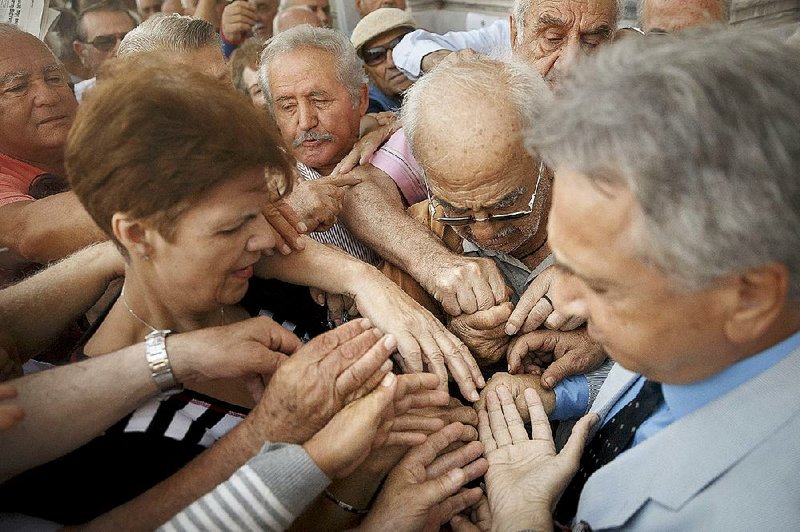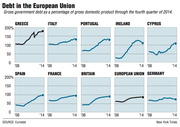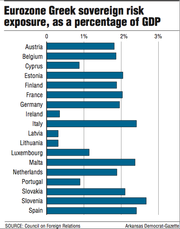ATHENS, Greece -- Eurozone finance ministers decided Wednesday to break off talks on more aid for Greece until after the country holds a weekend referendum to let the people decide whether to accept more austerity measures in exchange for a rescue deal.
RELATED ARTICLE
http://www.arkansas…">Greece's debt crisis explained
After a late-night teleconference, the chairman of the eurogroup said the 19 ministers had decided to put any further negotiations on hold.
"There will be no talks in the coming days," Eurogroup President Jeroen Dijsselbloem said Wednesday evening. "We will simply await now the outcome of the referendum on Sunday."
Earlier Wednesday, Prime Minister Alexis Tsipras, who called the popular vote for Sunday, said it would go ahead as planned, and he again urged citizens to vote against the austerity measures that Europe has demanded as a condition of financial rescue.
In a televised address to the nation, he said a "No" result would not mean Greece would have to leave the euro currency, as many European officials have argued. Rather, Tsipras said, it would give the government a stronger negotiating position with creditors.
"There are those who insist on linking the result of the referendum with the country's future in the euro," Tsipras said. "They even say I have a so-called secret plan to take the country out of the [European Union] if the vote is 'No.' They are lying with the full knowledge of that fact."
The hastily called referendum is based on creditor proposals made last week as part of a negotiation with the Greek government. Those proposals were later updated and are now no longer on the table because the European part of Greece's bailout program expired at midnight Tuesday.
After insisting for days that Europe's offer was intolerable, Tsipras sent a letter late Tuesday night to Greece's main creditors in which he appeared to open a space for significant concessions in the cash-for-cutbacks standoff, suggesting that he could agree to the stringent austerity measures he once repudiated.
His letter proposed some changes to EU demands. He continued to ask for a lower value-added tax on Greek islands, to help bolster tourism and compensate for the high price of delivering goods to such areas. And he still objected to a system of automatically adjusting pension payments to coincide with the financial strength of the underlying pension funds rather than relying on government assistance to maintain the payments.
But he accepted the bulk of what the Europeans had asked for in their last proposal, including creating strong disincentives to early retirement.
With Greece now cut off from its financial lifelines, the proposal also reiterated a request for a new $32 billion bailout and more relief from Greece's crushing debts than EU leaders have been prepared to offer.
Revived hope of a deal sent European stock markets higher Wednesday after two days of downturns. Wall Street stocks also rose.
But some European countries -- including Germany, the largest single contributor to Greece's bailout -- said Tsipras' proposal wasn't good enough and that a deal remained impossible before the referendum.
"We will wait for the referendum," Chancellor Angela Merkel told the German Parliament. "There can be no negotiations on a new aid program before the referendum."
French President Francois Hollande urged an accord before then, saying "there is always a risk" of turbulence and a "leap into the void."
He said it was the responsibility of other countries that use the shared currency to keep Greece in the eurozone.
Hollande, a Socialist who has been one of the few remaining EU allies of Greece's leftist government, criticized "intransigent comments" and "vetoes or roughness," in an apparent reference to Germany's tough stance.
"It is our duty to keep Greece in the eurozone," he said. "That depends on Greece ... but it also depends on us."
The situation was further clouded Wednesday by questions about the Greek referendum's framework from Thorbjorn Jagland, head of the Council of Europe, an advisory body that monitors elections and human rights.
Jagland said the planned vote did not meet international standards, failing, among other things, to give two weeks' notice. The Council of Europe has no enforcement powers, but the observations could boost critics of the planned vote, including Greek opposition leaders.
Anxiety at banks
Greece is in financial limbo now that its bailout program has expired, cutting it off from vital financing. It also has become the first developed country to fail to repay a debt to the International Monetary Fund on time. The previous country to miss an IMF payment was Zimbabwe in 2001.
As long as it is in arrears on the IMF payment, Greece cannot get any more money from the organization. The country has put limits on cash withdrawals to keep banks from collapsing after Greeks rushed to pull money out of ATMs after the referendum call. Greeks are now limited to daily ATM withdrawals of $67 and cannot send money abroad without special permission.
In Athens, crowds of anxious retired Greeks thronged banks beginning before dawn Wednesday, struggling to withdraw their maximum of $134 for the week after the government reopened some banks to help pensioners who don't have bank cards.
The government said about 1,000 bank branches would open for three days starting Wednesday to give such pensioners access to some cash.
But a seeming last-minute decision to serve customers on an alphabetical basis led to chaotic scenes of confusion and anger at some banks, with many pensioners waiting hours to eventually be told they would have to return today or Friday.
Others were told that their pensions had not yet been deposited, and they would have to return later in the week.
"It's very bad," said retired pharmacy worker Popi Stavrakaki, 68. "I'm afraid it will be worse soon. I have no idea why this is happening."
Pensions are an institution with huge symbolic significance in Greece's present crisis, experts said.
European creditors have been demanding changes in a highly fragmented pension system that allows some people, including members of special interest groups, to retire early, which the creditors said puts an unequal burden on society.
"Pensions are the way to drum up political spirit," Platon Tinios, an economist and assistant professor at the University of Piraeus, said Wednesday.
"One of the great things about having young pensioners is that they're in pretty good shape for getting down to the streets for demonstrations," Tinios continued. "They're not hanging around old-age homes. They're out in force in cafes playing backgammon. So they function as in important part of any political pressure, and it's important to have them on your side."
Tinios said the pension system is like a "kaleidoscope" that could be tilted one way or another to produce different images. Despite talk of deep cuts, he said, only the top tier percent of pensions had been sharply cut, while more typical pensioners had their Christmas, Easter and summer bonuses eliminated.
"You can actually make an argument that pensioners have been shielded to a greater extent than other categories, such as the unemployed and families with children," Tinios said.
Nonetheless, he said, he sympathized with the pensioners.
"Oh, absolutely, these are the people that everyone should be trying to support, rather than trying to mislead to get their votes," Tinios said. "And, well, the people you see in the queues are the people who are really the least fortunate, because the early retirees with high pensions, of course, are technically savvy enough to be able to operate ATMs."
Meanwhile, many ATMs had run out of some denominations of bills, effectively cutting the amount of cash Greeks have access to.
Capital controls will remain in place until at least next Tuesday, officials have said.
Two Greek officials with knowledge of the situation said some Greek banks could run out of cash by Monday.
With the country facing such dire prospects, Pope Francis asked Catholics to pray for the Greek people as they endure a "keenly felt human and social crisis."
Information for this article was contributed by Elena Becatoros, Geir Moulson, Angela Charlton and Gregory Katz of The Associated Press; by Michael Birnbaum, Griff Witte, Anthony Faiola and Brian Murphy of The Washington Post; by Suzanne Daley, Niki Kitsantonis, Andrew Higgins, Melissa Eddy, Dimitris Bounias and Anemona Hartocollis of The New York Times.
A Section on 07/02/2015



